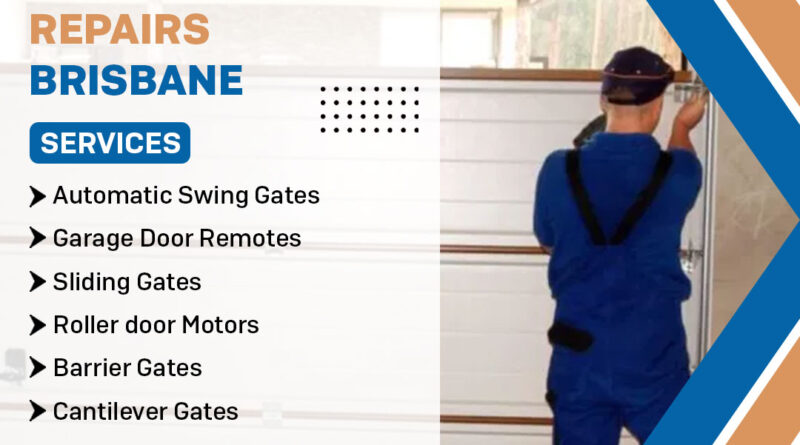What Are the Common Signs Your Garage Door Needs Repair?
Garage doors are essential for home security and convenience, but like any mechanical system, they require maintenance and occasional repairs. Ignoring signs of trouble can lead to bigger problems, costly repairs, or even safety hazards. Recognizing the signs early can help keep your garage door functioning smoothly. In this article, we’ll explore common indicators that your garage door might need some professional attention.
1. Unusual Noises During Operation
One of the most obvious signs that your garage door needs repair is hearing unusual or loud noises when the door is in use. While garage doors are never entirely silent, grinding, squeaking, or banging sounds usually indicate that something is wrong. Here are some common causes of these noises:
Grinding or Rattling: This could suggest that there are loose hardware components, such as bolts or hinges, that need tightening.
Squeaking: This noise often means the door’s rollers, tracks, or chains need lubrication.
Banging or Popping: This may be a sign of a torsion spring problem, which can be dangerous if not promptly addressed.
If your garage door suddenly starts making new, unsettling sounds, it’s a good idea to call a professional technician to diagnose the issue.
2. The Door Moves Unevenly or Jerks When Opening and Closing
A smoothly operating Garage Door Service should move uniformly without jerks or hesitations. If you notice the door shaking or moving unevenly, it’s a sign that something is off balance. Potential issues include:
Worn-out Springs: The springs might be losing tension, which can cause jerky or inconsistent door movement.
Track Misalignment: The tracks may have shifted or become damaged, preventing the door from gliding smoothly.
Roller Damage: Worn or broken rollers can lead to uneven movement, making operation noisy and rough.
If the door isn’t moving smoothly, you should avoid using it until a professional has inspected and fixed the problem, as continued operation could worsen the damage.
3. The Door Won’t Open or Close Properly
A garage door that refuses to open or close correctly can be frustrating and may indicate several underlying issues. Some common causes include:
Faulty Remote or Wall Switch: If your garage door isn’t responding to the remote or wall-mounted switch, there could be an electrical problem or a malfunctioning motor.
Broken Springs or Cables: The springs and cables are crucial for lifting and lowering the door. If they break or wear out, the door may get stuck.
Obstructions in the Track: Dirt, debris, or small objects in the tracks can prevent the door from opening or closing smoothly.
If you experience any of these issues, you should troubleshoot simple fixes like changing the batteries in your remote or checking for obstructions. However, if the problem persists, professional intervention is necessary.
4. The Door Feels Heavier Than Usual
Garage doors & Swing Gates are designed to be balanced, so even though they are heavy, you should be able to lift or lower them manually with relative ease. If the door feels heavier than usual, this could be a sign that the springs are losing tension. A heavy door can be dangerous, as it might suddenly close or become impossible to lift.
Testing the door balance involves disconnecting the door from the automatic opener and lifting it manually. If it’s difficult to lift or it doesn’t stay in place when you let go, the springs are likely failing. Never try to adjust or replace springs on your own, as they are under high tension and can cause serious injury.
5. Slow Response Time
When you press the button on your remote or wall switch, your garage door should start moving within a second or two. If there is a noticeable delay in the response, there could be several issues to consider:
Problem with the Remote Signal: Check if the batteries need to be replaced or if there is interference with the signal.
Worn-out Motor or Malfunctioning Opener: A sluggish response could mean the motor is beginning to fail or that the opener is encountering electrical issues.
Friction in the System: Lack of lubrication or damage to components can slow down the operation.
If your garage door is consistently slow, it’s best to have a professional evaluate the opener and other moving parts.
6. Sagging or Misaligned Sections
A sagging garage door is usually an indication of structural issues. You might notice this problem if your door doesn’t stay in its raised position when opened or if one side hangs lower than the other. Potential causes of a sagging garage door include:
Worn-out Torsion Springs: These are responsible for supporting the weight of the door, and as they weaken, the door may start to sag.
Damaged Panels or Sections: If individual panels are broken or weakened, it can affect the alignment and structural integrity of the entire door.
Regular maintenance, such as checking the door balance and inspecting panels, can help prevent sagging. If you already notice misalignment or sagging, schedule a repair to avoid further complications.
7. The Door Reverses Before Fully Closing
Garage doors are equipped with safety features that prevent them from closing on objects or people. If the door starts closing but then immediately reverses, it may be caused by:
Misaligned or Dirty Sensors: The safety sensors near the bottom of the door might be blocked or dirty. Cleaning and aligning them can often resolve this issue.
Spring or Cable Issues: If the door doesn’t close all the way and reverses, there may be a problem with the tension springs or cables.
Track Obstructions: Check for any debris or damage in the tracks that might interfere with proper closing.
Safety features are crucial for preventing accidents, so if your garage door’s auto-reverse function is not working correctly, it’s important to get it fixed promptly.
8. Visible Damage to Door Components
Regularly inspect your garage door for any visible signs of damage. This includes checking for dents or cracks in the door panels, frayed cables, or loose hardware. While some minor issues can be fixed with basic tools, more significant damage should be handled by professionals.
Conclusion
Garage Door Repairs are a vital part of home security and convenience. By paying attention to warning signs like unusual noises, jerky movements, or slow response times, you can address issues before they become serious problems. Regular maintenance and prompt repairs will extend the life of your garage door and keep it running safely and efficiently. If you notice any of these signs, don’t hesitate to reach out to a qualified garage door repair professional.
Read Also: Essential Guide to Garage Door Repairs and Services


